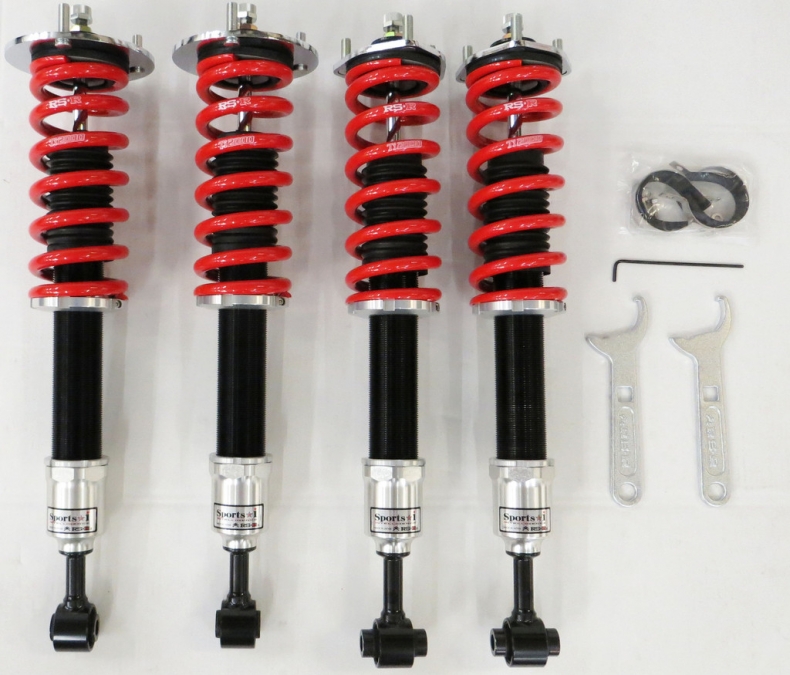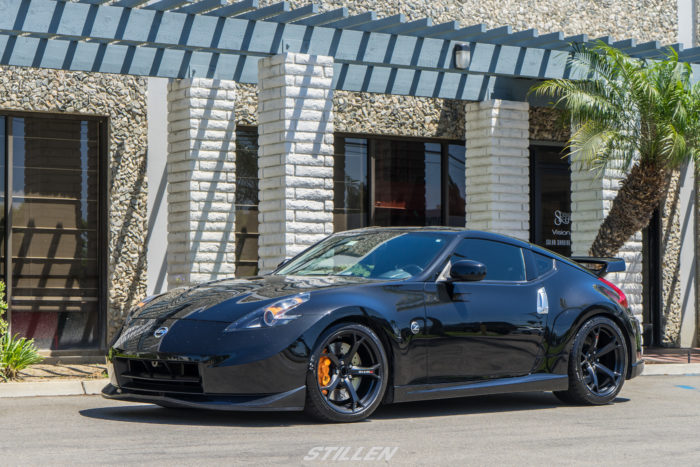
 |
We recently went over the basics of lowering your vehicle with springs and shocks in our Suspension 101 article. While this covered the basics, we know a lot of enthusiasts
|
|||||||
 |
|
|
LinkBack | Thread Tools | Display Modes |
|
|
#1 (permalink) |
|
Base Member
Join Date: Dec 2013
Location: Costa Mesa, California
Posts: 216
Drives: 2009 370Z
Rep Power: 21            |
We recently went over the basics of lowering your vehicle with springs and shocks in our Suspension 101 article. While this covered the basics, we know a lot of enthusiasts are looking for more capability than what springs and shocks alone can offer. That takes us to the next stage of Best Suspension 201: Coilovers.
When you hear the phrase “coilovers”, most people are referring to an aftermarket replacement damper and spring combination. The term coilover originated from the design of the coil spring being placed over the shock. This description does not apply to all “coilovers” as some still utilize a separate spring and shock setup depending on vehicle application. For this article, we will be using the term “coilover(s)” in reference to the adjustable aftermarket replacement suspension systems. Advantages of a Coilover System are (this can depend on the model):
 So what do these advantages mean for us? From the performance perspective: Having a spring and damper engineered to work together is paramount to performance. One of the limitations of a typical lowering spring is that one must match the spring fairly well with the OEM dampers. This generally means limited spring rates as well as a progressive spring design. When it comes to coilovers, extefnd higher spring rates which means improved handling (within reason). A non-OEM spec damper means a lot of coilover systems use linear rate springs which gives more consistent feedback as well as more predictable handling. Ride height adjustability at all four corners gives you the ability to optimize suspension geometry as well as achieve the proper balance of a lower roll center and vehicle pitch (aerodynamics). Adjustable dampening can be a big performance benefit when it comes to versatility. On a smoother road, or track, you can increase compression (the rate at which the dampener compresses under pressure) and rebound (the rate at which the damper returns to resting height after compression). In turn this reduces roll, increases pressure on all four tires, and keeps weight transfer in and out of turns under control. This type of setup is ideal on a smooth road or track as bumps and moderate imperfections in the road can quickly unsettle the car- potentially causing a loss of control. On a rougher road, or track, you can decrease your rebound and compression. While this will allow for a little more body roll (which can be countered a bit by stiffening the sway bars), when encountering bumps and imperfections in a turn the suspension will absorb them more effectively without getting unsettled. The option of changing preload/compression length of a spring is completely performance oriented. Corner balancing is the technique of utilizing spring preload (the amount of pressure on a spring set by the length) to balance a car. Production cars are not perfectly balanced from the factory as most of you know. For handling performance it is ideal to balance the weight of the car as equally as possible. While this can be a little easier to accomplish in a full race car, most people don’t want to remove interior bits from their car and move things around too much. So how can we accomplish more balance without removing parts of the car or adding weights? Corner balancing is done by weighing the car, then placing each wheel on an independent scale. Using those weights, one can calculate how to adjust the spring rate so the pressure on each tire can be close to even on each corner. This is typically done with the driver in the car as that greatly affects weight distribution. For an example, let us say we have a 370Z that we are corner balancing. For simplicity we will just do the front right to left balance. We find the weight on the front right tire is 850 lbs (or 385.5 kg) and 905 lbs (or 410.5 kg) on the front left tire. If we want to balance that out we can increase the effective weight on the front right tire by compressing that spring. If we have a spring rate of 560 lb/in (10 kg/mm) we are adjusting to correct for the 55 lb difference (or 25 kg) we simply need to calculate the increase via percentage. 55 lbs is 9.8% off 560 lbs (or 250% of 10 kg). So we simply multiply 1 inch by 9.8% (or 1 mm by 250%) so see how much to compress the spring (you can also decompress the side with the higher weight by the same amount instead).  2010 Nissan 370Z sitting on RS-R Sports-i coilovers. From the aesthetics and comfort perspective: For many enthusiasts, the goal of lowering is primarily aesthetic. When the goal is to achieve a specific look, many enthusiasts don’t want to sacrifice ride quality. While spring rates and dampening affect performance greatly, it also makes a big impact on comfort. While you might not select the same coilover for racing as you would for daily driving, there are a lot of options that can offer a high level of versatility. For example, the RS-R Sports-i coilovers work fine for track days, but they can be adjusted to be extremely comfortable on the street (often times more comfortable than stock). They utilize features such as rubber bushings in the mounting hats, rebound and compression adjustability, as well as height adjustment independent from spring preload to retain a very civilized ride quality and NVH (noise, vibration, and harshness). Lower rebound and compression usually means a softer and more compliant ride even when running a higher spring rate than stock. So just because a spring rate looks high on a coilover system, don’t assume immediately that it won’t be comfortable. There are so many reasons to have height adjustability. Everyone has their preference of what an ideal ride height is, and there are definitely looks that can’t be achieved with traditional lowering springs. Because most modern cars have a higher fender line in the front wheel wells, lowering often results in a larger wheel gap in front if the spring lowers evenly. With the adjustability of coilovers you can easily get the wheel gap you want. We hope this helps you with your suspension knowledge. There are still many details we did not go over. If you have further questions about the Best Suspension 201: Coilovers, we would be happy to answer you.
__________________
Financing with Affirm now available!!! STILLEN | Robin | Performance Specialist | rmoses@stillen.com| 800.576.2131 x133 | |
|
|

|
 |
| Bookmarks |
|
|
 Similar Threads
Similar Threads
|
||||
| Thread | Thread Starter | Forum | Replies | Last Post |
| SPL Suspension help, KW coilovers V3 | EastBayZ | Brakes & Suspension | 21 | 03-10-2017 10:16 AM |
| Coilovers vs. stock suspension at the track | cossie1600 | Track / Autocross / Drifting / Dragstrip | 18 | 12-02-2014 11:55 PM |
| [FOR SALE] UAS Air Suspension with BC coilovers | Ni55anPat | Parts for sale (Private Classifieds) | 15 | 06-12-2014 11:57 PM |
| Questions on Nismo Suspension?? Coilovers?? | NickNismo | Nismo 370Z | 8 | 05-28-2014 05:27 PM |
| Tein Mono Flex Coilovers Suspension | LateralG'z | Brakes & Suspension | 0 | 01-10-2010 09:53 AM |